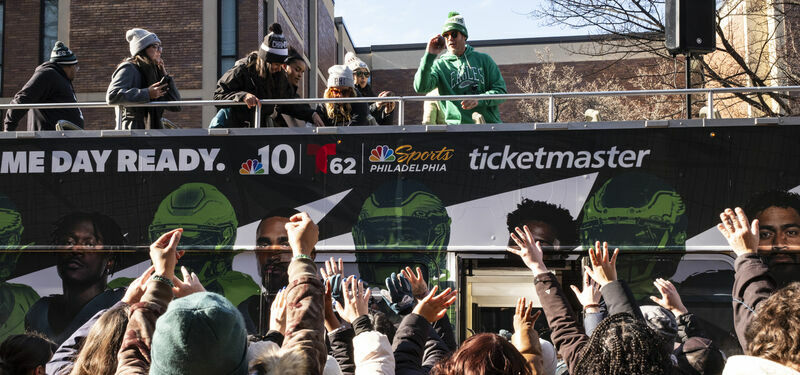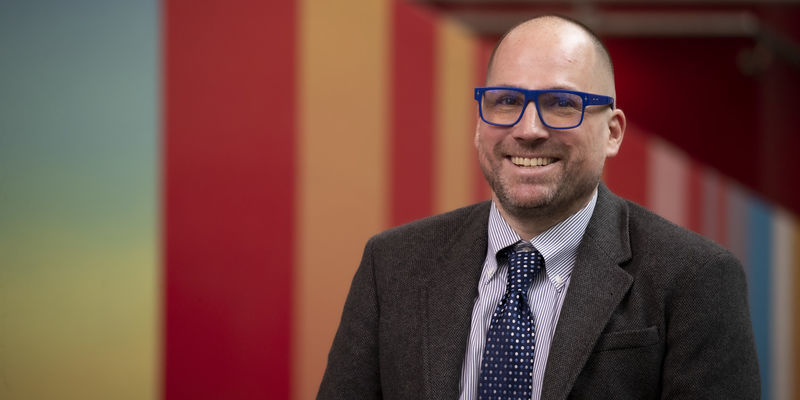As SNL celebrates its 50th anniversary, a Temple faculty expert discusses its enduring appeal
Ahead of the three-hour 50th anniversary special of Saturday Night Live on Feb. 16, Professor of Sociology Dustin Kidd explains why audiences have continued tuning in to the show for five decades.

Since its premiere on Oct. 11, 1975, Saturday Night Live has become a cultural institution, with lines from its skits (“More cowbell!”) becoming a part of Americans’ daily lexicon. The live weekly program is famous for its parodies of commercials, impersonations of politicians, celebrity guest appearances and musical acts. On Sunday, Feb. 16, NBC will air a three-hour “SNL 50: The Anniversary Special” featuring current and past cast members and celebrity guests, as well as “SNL50: The Homecoming Concert” on Feb. 14.
Temple Now spoke with Dustin Kidd, professor of sociology at the College of Liberal Arts, about what has made Saturday Night Live such an enduring part of America’s pop culture landscape over the past 50 years.
Temple Now: What are the qualities of Saturday Night Live that have made it into a lasting cultural institution?
Dustin Kidd: I think there is a sense that, as a satire of American culture, it is always reflecting something back at us and showing us something about who we are. It is able to consistently do that, even as American society changes so much over time.
TN: What have been the most important changes to SNL in the past 50 years?
DK: What’s more important is that the method of the show doesn’t change, even as the culture it satirizes does. It’s been sketch comedy consistently and it’s been a live show consistently. It has featured music consistently. There’s this sense that the show is, as they say, not ready for prime time, since the cast is called the Not Ready for Prime Time Players, and that’s why SNL is at 11:30 p.m., well after prime time. That gives more of an experimental vibe to the show. And yet it’s on a major broadcast network and so it’s part of what we would call the monoculture, giving this sense that everybody needs to know about this thing. It teaches you how to think about humor in a way that maybe has more power than something else, because you’re consuming it alongside your friends and alongside the larger culture. And so, everybody’s talking about that sketch on Monday morning, whereas that other funny thing you saw on TikTok or elsewhere is limited to a much smaller audience.
TN: What is the significance of SNL as a piece of pop culture that parodies other pop culture?
DK: We live in a culture that takes itself very seriously and having a moment to take it less seriously gives us a chance to breathe, to see where the cracks and ruptures are in our culture and in our politics and in other spaces. And so, if you have a politician who presents in a very strong way, whoever that might be, and then you see a satire of that politician that shows the ways in which they actually might not make any sense at all, that can be very helpful to us. It kind of gives us the space to critique that politician or critique that institution, whatever it might be.
TN: Do the political impersonations have any real impact, either positive or negative, on public opinion of those politicians?
DK: I think that’s hard to say, because the satire of politicians has been consistent across party lines. And so it’s not as if the show necessarily goes after one group or another, although I think it’s pretty fair to say that it’s a liberal show. There have been conservative comedians on the show at various points, but not many, and conservative positions have been taken by the show, but not many.
SNL has made a lot of critiques of Donald Trump over the years and that hasn’t stopped Americans from voting for him. So, in terms of power over voting outcomes, maybe not. But in terms of power over the way that we think about these people, I do think it’s helpful for us to have a space to critique them and to satirize them and I think people remember those sketches more so than some of the more mundane sketches.
TN: What are the most impactful skits in SNL’s history?
DK: I would say, probably pretty consistently, the political sketches, but some of the commercial parodies have just been hilarious, and people go back to them just for that sense of true relief, like Tina Fey and others in the Mom Jeans commercial. And all the sketches where the characters “break,” or break into laughter during the sketch. There’s this lore that SNL’s creator and executive producer Lorne Michaels doesn’t like it when they break, and yet the favorite thing for audiences is to see those cast members crack each other up. The very first Debbie Downer sketch comes to mind. There are other sketches like that where the characters make each other laugh, and when we see that they can make each other laugh, I think that makes us even more likely to enjoy that sketch.
TN: It’s been said that SNL couldn’t really exist without Lorne Michaels. Why exactly is he so inextricable from the show?
DK: That’s a great question, because he himself is not a particularly funny person. They often make fun of how dry his humor is, and maybe he’s not actually humorous at all. It’s interesting that he had this vision for the show so long ago, and it has persisted for so long. The show survived without him for a few years in the 80s, but it was very clear that it was better with him and they brought him back. And I think we’re at a stage now where we’re wondering what’s going to happen after Lorne Michaels, assuming the show persists. The most conversation I’ve seen has been around bringing in Tina Fey or someone like her as the next producer for the show.


